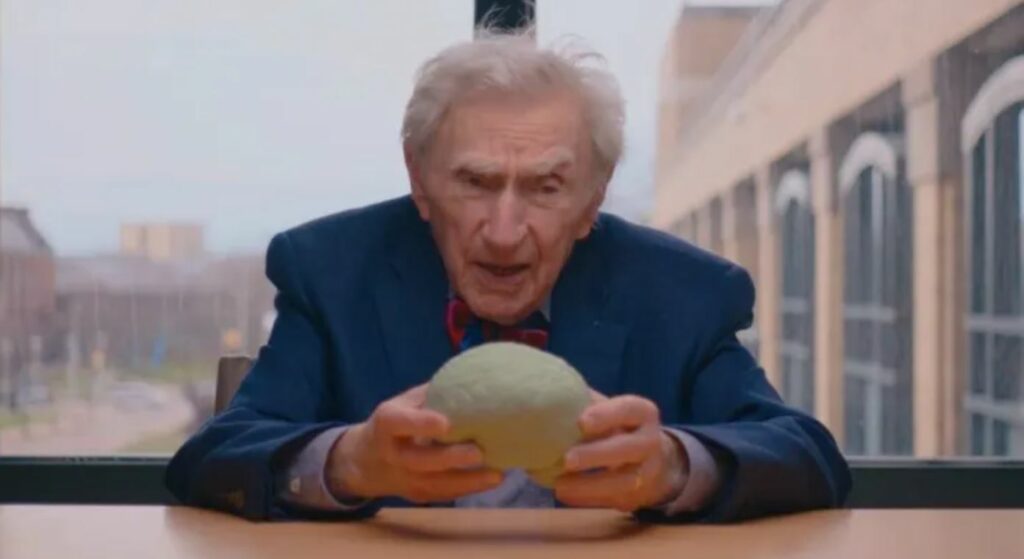Getting older is tough. It takes on a toll on both the body and brain. While the brain isn’t actually a muscle it’s still important to “exercise” it. Fortunately, there are apps and activities available through a number of avenues that will help keep the brain strong working condition. For example, the man whom some call ‘the world’s oldest doctor,’ still practicing at 101 years old, shares his rule for keeping his brain sharp. His rule is to follow three important “daily rituals“.
Still practicing medicine, Howard Tucker has been practicing medicine since 1947. Helping others to maintain their health, as well as maintaining his own has given him a great deal of insight into the inner workings of how to keep up good overall health. Particularly because of his age, and how long he’s been in the medical field. He explains that brains need constant exercise. “I use three daily rituals to boost my brain health.” He said.

First, he goes to work every day. For some that can seem like a nightmare. However, it does wonders in helping the oldest doctor be able to keep up with his brain health. “Research shows a correlation between retiring and increased cognitive decline,” explained Dr. Tucker. “I was named the world’s oldest practicing doctor by the Guinness World Records. Sara, my wife of 66 years, also still practices psychoanalysis and psychiatry at age 89.”
“My job requires me to review a number of medical subjects and think through problems. Staying up to date with the latest advancements in neurology keeps my brain busy.” He continued. “Volunteering, pursuing a hobby and learning new skills can provide great mental stimulation. In my early 60s, for example, I attended law school at night, after conducting my full-time medical practice. I passed the Ohio Bar Exam at 67.”
There are seemingly endless complexities within our bodies and our minds that need tending to, including keeping up brain health. Not only does continuing to work, as well as pursuing hobbies, keep the mind sharp. It also helps to give people a sense of purpose and fulfillment. Necessary for keeping one motivated to enjoy life.
Next, Dr. Tucker explains that strong relationship bonds may help the brain, both with cognition and memory. “I am fortunate that my job has allowed me to build relationships with younger colleagues. Sara and I also make it a priority to have dinner with people in our community.” He shares. “At least twice a week, we eat with my daughter and her husband and my son and his wife. We enjoy trying new restaurants with friends and colleagues, too.”
Most people are aware of the importance of socialization. For example, dogs are better behaved. Children are calmer and feel a deeper sense of security. Adults benefit from the support they get from others with whom they’re deeply connected. Therefore, it’s unsurprising that the mind would also benefit from social interaction and deep connections with others.
More than just Medical Books
Dr. Tucker mentioned that his job keeps him up to date on the latest in neurology, including emerging treatment options. However, his reading extends far beyond his professional interests. “I like to read biographies and detective stories.” He disclosed. “Immersing yourself in a good book, fiction or non-fiction, requires your brain to process a bulk of new information. I believe this is key to keeping your mind sharp.”Our brains go through “natural changes“. Particularly as we age. Some parts of the brain may shrink. As a result, communication in the brain as well as blood flow begin to “decrease“, making it more challenging for a brain to function healthily and strong. “Keep your mind engaged through work, social and entertainment activities.” Dr. Tucker emphasizes.
Sleeping and Eating are Integral
While consistent exercise is a great way to help keep your brain in tip top shape, there are other tasks that are also important for maintaining brain health. And overall well-being. The oldest doctor shared his beliefs for why he, and his wife, as still functioning, able to work, and find joy in their lives. Some other commonly known activities include physical movement, getting enough rest, eating well, spending time outdoors, and so on. On the other hand, some methods to keeping up a healthy brain and body aren’t spoken about as often. Nonetheless, they can be just as beneficial to ensuring overall brain and body health.
The oldest doctor explained that staying actively engaged with people and tasks every day is essential but there are more in-depth recommendations to consider. For example, he stresses the importance of working, reading, and doing a hobby but another possible avenue for exercising your brain includes learning. It’s suggested to try new hobbies and take classes or read books that are informative and educational. Furthermore, remember that repetition is also important. This way, the brain will always be creating new neurological pathways.
Mind Over Matter
Our minds can be incredibly powerful. Interestingly they have the ability to convince us that something is wrong when it may not always be that way. For example, “myths about aging can contribute to a failing memory.” According to Harvard Health. Therefore, believing in your own brain’s ability to function is essential to keeping up a strong and healthy mind.
Growing older in inventible, and most cases not an enjoyable experience. However, the oldest doctor still practicing medicine, as well as other experts, have shed some light on the stigma around aging. Proving that it’s possible to do gracefully and joyfully.
Read More: World’s Oldest Woman Lived to 117 and Ate The Same Things Everyday
Sources
- “6 simple steps to keep your mind sharp at any age.” Harvard Health. May 26, 2020.
- “What Is the Physical Composition of the Human Brain?” Healthline. Adrienne Santos. Longhurst April 8, 2019.
- “At 101 years old, I’m the ‘world’s oldest practicing doctor’: My No. 1 rule for keeping your brain sharp.” CNBC. Howard Tucker. August 10, 2023.